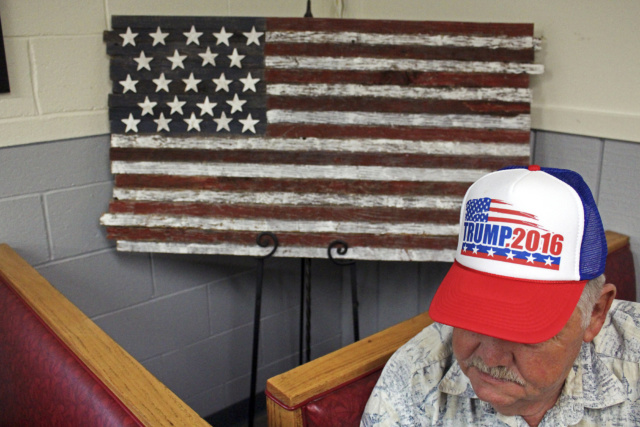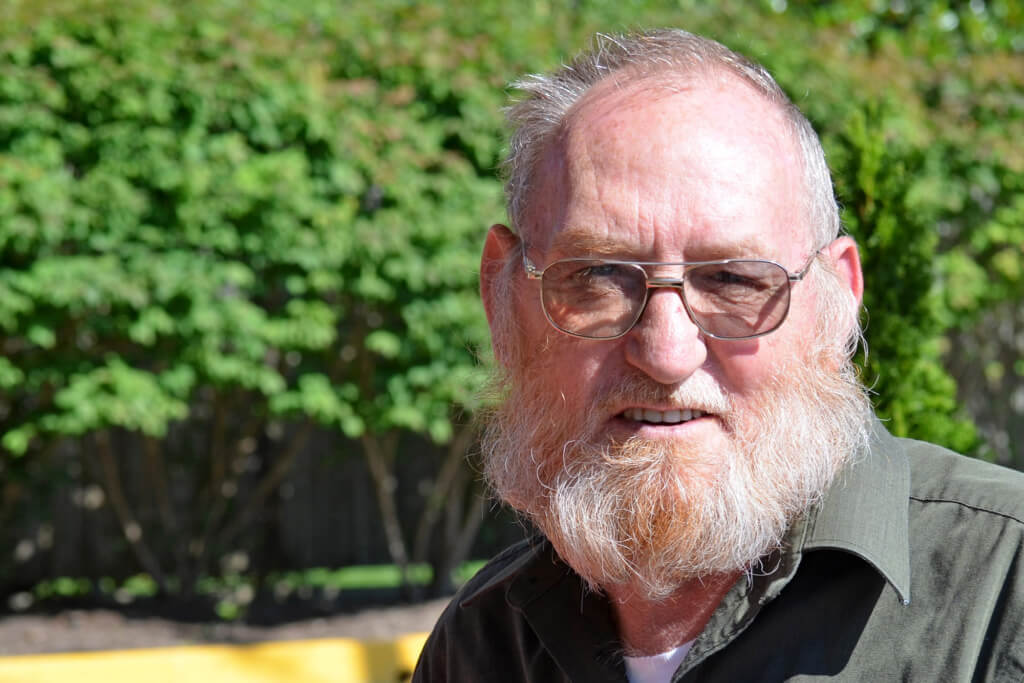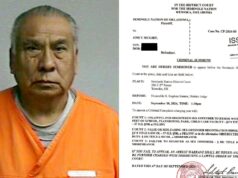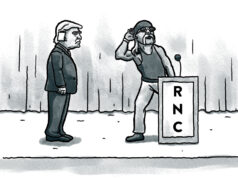
By Emily Mills, Jimmy Miller and Lian Bunny
News21
YOUNGSTOWN, Ohio — Trump signs in her backyard. Trump magnets on her refrigerator. Trump buttons on her dining room table. Kathy Miller is the Mahoning County chairwoman for Donald Trump.
While handing out Trump signs in June at a Republican headquarters just south of here, she was approached by a woman in her late 80s who said, “I have never voted Republican in my life. Give me the biggest sign you’ve got.”
In economically struggling communities like Mahoning County — where most steel mills have closed — many working-class whites registered as Democrats are voting for Trump, registration records and 2016 presidential primary results show.
“They’re just all fed up,” Miller said. “It may be the economy for some, it may be the school systems, it could be health care, it could be immigration, education, it could be anything. They’re just fed up with the direction of our country. Mr. Trump showed up at the right time.”
According to a November 2015 Public Religion Research Institute poll, 72 percent of Americans and 78 percent of white working-class Americans believe the country still is in a recession. A News21 analysis of the General Social Survey conducted by the National Opinion Research Center at the University of Chicago also found that in 2002, the percentage of white Americans with hardly any confidence in the executive branch of the federal government was just under 20 percent, the lowest it had been between 2002 and 2014. By 2014, that number was nearly 50 percent. See the interactive table below for more questions and results.
“The disenfranchised voter who has lost their job as a result of policies affecting the coal industry and other heavy manufacturing jobs are feeling very frustrated with Washington,” said Rex Repass, founder and CEO of Repass, a national public opinion research and strategic consulting firm. “Even though many are historically Democratic counties, they have become very red and very angry.”
Economic factors defining party lines

Unemployment in Clay County, which is nearly 97 percent white, has petered out to a little more than 5 percent in May 2016, just over the May national average of 4.7 percent.
Yet the county still has a 24 percent poverty rate and historically Democratic voters are switching to the Republican Party. In March’s Republican primary, Trump won Clay county 57.1 percent to Ted Cruz’s 17.1 percent and had more than double the votes of Democratic nominee Hillary Clinton.
Timothy Scott, the former Democratic chairman in Clay County, said older people come to retire in Clay County because of nearby Dale Hollow Lake, which attracts 3.2 million visitors to the county annually. Scott said more of these retirees tend to vote Republican, but he still attributes much of Trump’s appeal to his rhetoric.
“I think his popularity is (because) just everybody is mad, and he is saying what they feel,” he said. “There will be a lot of Democrats voting for him.”
While older generations have been moving into the community, Scott said young people in the area are leaving because there aren’t jobs once they graduate.
Young said Clay County voters feel ignored by politicians who they believe aren’t doing anything to bring jobs back to the area. “I really do think it’s this attitude that we lost our jobs and nobody’s really come to help us,” Young said.
Forty years after its steel mills closed, Youngstown’s poverty rate is just over 40 percent.
“The opportunities aren’t here,” said Frankie Susany, 50, who grew up in the Youngstown area and now works there as a small-business owner. “What used to be a thriving city in Youngstown is brown fields, abandoned mills, abandoned buildings, abandoned factories.”
Trump’s “Make America Great Again” message resonates with Susany, who said that when he grew up, young people who worked in the steel mills had great lives. They drove new cars and had their own places to live right out of high school.
Now, with that steel industry gone, Susany believes voters need to cast their ballots with future generations in mind. “That’s what this election is about,” he said. “If we don’t change it now, our grandchildren are never going to know the America that (people my age) grew up in.”
Policy changes incur disdain

Pervis Jacobs, 65, grew up in Hindman, Kentucky. He’s a lifelong Democrat, but he’s voting for Trump. “I feel like I have no choice,” said Jacobs. “I just don’t like the Democrats’ policies anymore.”
Many Trump supporters criticize increasing government regulations, President Obama’s health care law and immigration.
Nick Patterson, joint operating officer of Honest Abe Log Homes and president of Barky Beaver Mulch in Clay County, Tennessee, said the companies used to employ about 500 people and now employ 130.
“I think one of the things that’s so key in this political conversation over the last couple years is our overhead per employee has increased drastically,” he said. “It has come from federal regulations.”
Leslie Rossi, leader of a grassroots movement for Trump in Westmoreland County, Pennsylvania, said she was initially drawn to Trump because he said he would repeal Obamacare. Rossi, a landlord, painted one of her rental houses red, white and blue to support the GOP candidate.
A News21 analysis found in 2014, just over 48 percent of white Americans thought the number of immigrants should be reduced, according to data from the General Social Survey. Only 13 percent of the same demographic believe the number of immigrants should be increased.
The survey also found in 2014, nearly 29 percent of white Americans think immigrants take jobs away, and roughly another 7 percent strongly agree.
An outsider
Patterson said Trump is seen as a political outsider, especially to those who have felt ignored by typical politicians.
“When you get to the federal level, I think people do feel like they’ve not been listened to because you’ve seen policies being handed down that have not helped them,” he said. “I think some of the campaign promises that were made on that have simply not been true. And I think that affects people.”
Miller, the Mahoning County chairwoman for Trump, said Americans should forget politicians. Trump appeals to her because he’s a businessman, and Trump’s business background will create jobs and improve the economy.
“We need someone who understands business, can get things done, understands how the economy works (and) has employed people,” she said. “I think that’s my biggest beef with our regular politicians. … And I think Mr. Trump, he’s done it all.”
Scott, the former Democratic chairman in Clay County, Tennessee, said Republican candidates always talk about social issues such as immigration, gun control and gay rights, but the discussion this year seems louder than in past elections.
“(Trump’s) demeanor has brought a lot of these people out,” said Scott, who isn’t voting for Trump. “He’s made them vocal. He gives them courage.”
Miller said his supporters are seeking a definitive change, one they believe they will find in Trump.
“I think the generation like mine, we’ve seen it all. We’ve heard all the promises and we’ve just decided we’re done,” she said. “We just want a country that works, we want jobs, we want to protect our borders, we want to have a life for our children.”
(Editor’s Note: Taylor Gilmore contributed to this report.)






















